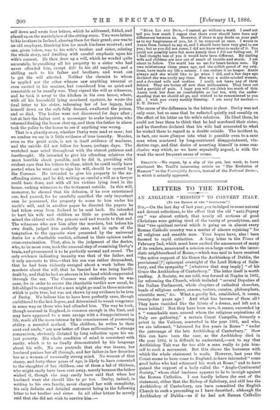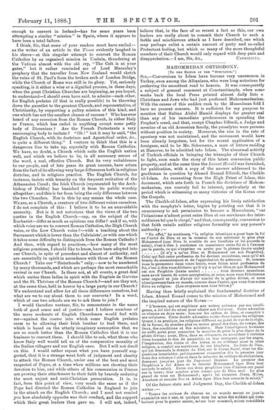LETTERS TO THE EDITOR.
AN ANGLICAN "MISSION" TO CONVERT ITALY. [To THE EDITOR OF THE " SPFCTATOR." I SIR,—On the last day of last year, you indulged in some natural and devout reflections, to the effect that the old "anti-Popery cry" was almost extinct, that nearly all sections of good Christians were getting tired of the vanity of proselytism, and that "the spiritual revival which is going on in almost every Roman Catholic country was a matter of sincere rejoicing" for all religions and sensible men. Your hopes have, alas ! been doomed to rapid extinction. A long letter in the Times of February 2nd, which must have excited the amusement of many of its readers, announced a mission on a large scale to the imme- diate neighbourhood of Rome,—which was said to have received. "the active support of his Grace the Archbishop of Dublin, the provisional [P] episcopal oversight of the Lord Bishop of Salis- bury, and the sympathy" [whatever that may imply] "of his Grace the Archbishop of Canterbury." The letter itself is worth reading. A Society, we are told, was formed at Naples in 1862, for reforming the Church, which included "several Deputies of the Italian Parliament, whole chapters of cathedral churches, heads of religions orders, canons, rectors, curates, philosophers, scientific men," Sic. What a goodly list, established, it seems, twenty-five years ago ! And what has become of them all ? They have vanished like the fabric of a dream, and left not a trace behind ! But they have been now, it seems, succeeded by a "remarkable man, around whom the religions aspirations of Italy are gathering," a certain Count Campello„ formerly a priest in the Vatican, converted in the year 1881, and who, we are informed, "laboured for five years in Rome" "under the patronage of the late Archbishop of Canterbury." How this can have been the case, as the Archbishop died in the year 1882, it is difficult to understand,—not to say that Archbishop Tait was far too able a man really to join him- self to such a movement. But this shows the looseness with which the whole statement is made. However, last year the Count seems to have come to England, to have interested" some good ladies who had witnessed his work at Rome," and to have gained the support of a body called the "Anglo-Continental Society," whose chief business appears to be to inveigh against the Roman Catholics. I can hardly believe the rest of the statement, either that the Bishop of Salisbury, and still less the Archbishop of Canterbury, can have committed the English Church to such a proceeding as I have described ; although the Archbishop of Dublin—as if he had not Roman Catholics
enough to convert in Ireland—has for some years been attempting a similar " mission " in Spain, where it appears to have been a total failure.
I think, Sir, that some of your readers must have smiled— as the writer of an article in the Times evidently laughed in his sleeve—at this singular attempt to convert the Roman Catholics by an organised mission in Umbria, thundering at the Vatican almost with the old cry, "The Celt is at your gates," but it rather reminded me of Lord Macaulay's prophecy that the traveller from New Zealand would sketch the ruins of St. Paul's from the broken arch of London Bridge, while the Church of Rome was still in its glory. Yet, seriously speaking, is it either a wise or a dignified process, in these days, when the great Christian Churches are beginning, as you hoped, to understand—I should even have said, to admire—each other, for English prelates (if that is really possible) to be throwing flown the gauntlet to the greatest Church, and representative, of Christianity, by supporting a paltry mission of this kind, and one which has not the smallest chance of success ? Who has ever heard of any secession from the Roman Church, in either Italy -or France, which has ended in anything except some petty body of Dissenters ? Are the French Protestants a very encouraging body to imitate ? "Oh !" but it may be said, "the English Church, with its doctrines and Apostolical order, &c., is quite a different thing." I venture to think that this is a dangerous line to take up, especially with Roman Catholics. We have, no doubt, a Church which suits the English nation well, and which we believe to be, in all necessary senses of the word, a real, effective Church. But its very suitableness to our people, and of late years its great success, have arisen from the fact of its allowing very large differences both in religions doctrine, and in religious practice. The English Church, for instance, insists with tenacity on the frequent recitation of the Athanasian Creed ; the Irish Church (represented by the Arch- bishop of Dublin) has banished it from its public worship altogether; and this is far from being the only difference between the two Churches. Nor is this by any means the whole case. We are, as a Church, a creature of two different voices ourselves. I do not complain of this : I believe it to be an unavoidable necessity. But is it not notorious that the views of the two -parties in the English Church—say, on the subject of the Eucharist—differ as much as opinions can differ? and if so, with which voice are we to convert Roman Catholics, the High Church voice, or the Low Church voice ?—with a teaching about the 'Sacrament which is lower than the Calvinists', or with one which it takes some difficulty to distinguish from the Roman Catholic? And then, with regard to practices,—how many of the most religious practices, I should like to know, have been adopted into our Church, in spite of precedent and almost of authority, and are essentially in spirit in accordance with those of the Roman Church ? Take our " Sisterhoods " only,—now to be numbered by many thousands, and which are perhaps the most remarkable revival in our Church. Is there not, at all events, a great deal which unites these ladies in spirit with the Eugenie de Gnerins and the St. Thereses of the Roman Church ?—and are they not, -at the same time, held in horror by a large party in our Church ? We understand and allow for all these differences ourselves, but what are we to say about them to our converts ? In a word, -which of our two schools are we to ask them to join ?
I would therefore venture, Sir, to remonstrate in the name both of good sense and of justice—and I believe numbers of the more moderate of English Churchmen would feel with me—against the course into which some English prelates seem to be allowing their Irish brother to lead them, and which is based on the utterly imaginary assumption that we are so much better than the Roman Catholics that it is our business to convert them. I should like to ask, what those who know Italy well would tell us of the comparative morality of the Italian villagers and our English ones. But I will not dwell on this. I would rather repeat what you have yourself sug- gested, that it is a strange want both of judgment and charity to attack the Roman Church, under one of the best and most -respected of Popes, at a time when millions are showing their devotion to him, and while others of his communion in France are proving their attachment to their faith by bravely enduring the most unjust and anti-Christian persecution. It is, in fact, from this point of view, very much the same as if the Pope had directed the Roman Catholics in England to join in the attack on the English Church ; and I need not remind you how absolutely opposite was their conduct, and the support which their great leaders then gave us. I will not., indeed,
believe that, in the face of so recent a fact as this, our own leaders are really about to commit their Church to such a feeble and mischievous attack as I have described, one which may perhaps enlist a certain amount of party and so-called Protestant feeling, but which so many of the more thoughtful members of their Church would only regard with deep pain and
disapprobation.—I am, Sir, dm, CATHOLICUS.



































 Previous page
Previous page